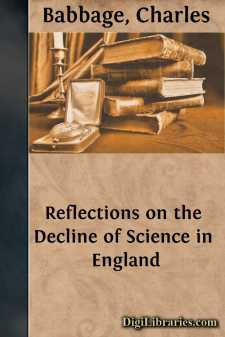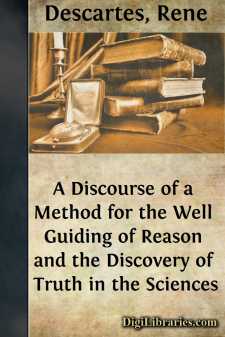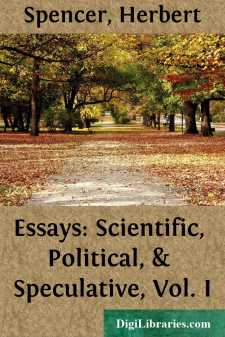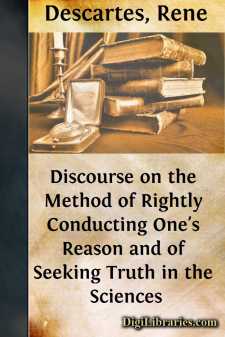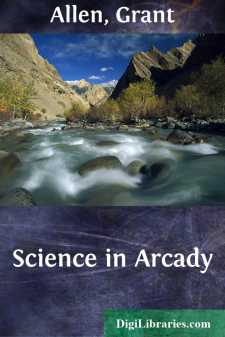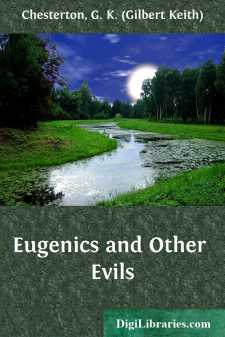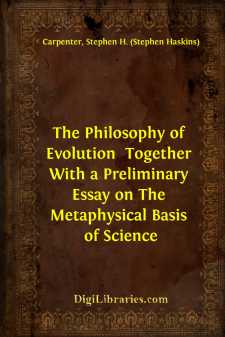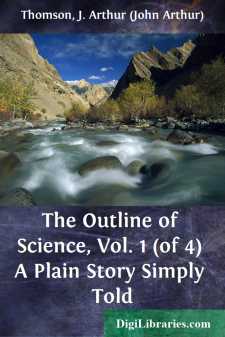Science
- Astronomy 18
- Biology 40
- Chemistry 13
- Electricity 1
- General
- History 6
- Light 1
- Paleontology 2
- Philosophy & Social Aspects 1
- Physics 3
- Relativity 2
- Study & Teaching 1
- Waves & Wave Mechanics 1
General Books
Sort by:
by:
Charles Babbage
CHAPTER I. ON THE RECIPROCAL INFLUENCE OF SCIENCE AND EDUCATION. That the state of knowledge in any country will exert a directive influence on the general system of instruction adopted in it, is a principle too obvious to require investigation. And it is equally certain that the tastes and pursuits of our manhood will bear on them the traces of the earlier impressions of our education. It is therefore...
more...
by:
Rene Descartes
PART. I. Right understanding is the most equally divided thing in the World; for every one beleevs himself so well stor’d with it, that even those who in all other things are the hardest to be pleas’d, seldom desire more of it then they have; wherein it is not likely that all Men are deceived: But it rather witnesseth, That the faculty of right-judging and distinguishing truth from falshood (which...
more...
by:
Herbert Spencer
THE DEVELOPMENT HYPOTHESIS. [Originally published in The Leader, for March 20, 1852. Brief though it is, I place this essay before the rest, partly because with the exception of a similarly-brief essay on "Use and Beauty", it came first in order of time, but chiefly because it came first in order of thought, and struck the keynote of all that was to follow.] In a debate upon the development...
more...
by:
Rene Descartes
PART I Good sense is, of all things among men, the most equally distributed; for every one thinks himself so abundantly provided with it, that those even who are the most difficult to satisfy in everything else, do not usually desire a larger measure of this quality than they already possess. And in this it is not likely that all are mistaken the conviction is rather to be held as testifying that the...
more...
by:
Grant Allen
About the middle of the Miocene period, as well as I can now remember (for I made no note of the precise date at the moment), my islands first appeared above the stormy sheet of the North-West Atlantic as a little rising group of mountain tops, capping a broad boss of submarine volcanoes. My attention was originally called to the new archipelago by a brother investigator of my own aerial race, who...
more...
It is an usual and a commendable practice to preface the discussion of the views of a philosophic thinker by some account of the man and of the circumstances which shaped his life and coloured his way of looking at things; but, though Zadig is cited in one of the most important chapters of Cuvier's greatest work, little is known about him, and that little might perhaps be better authenticated than...
more...
WHAT IS EUGENICS? The wisest thing in the world is to cry out before you are hurt. It is no good to cry out after you are hurt; especially after you are mortally hurt. People talk about the impatience of the populace; but sound historians know that most tyrannies have been possible because men moved too late. It is often essential to resist a tyranny before it exists. It is no answer to say, with a...
more...
All knowledge is essentially one. The object-matter upon which intellect exerts itself, does not affect the subjective act of knowing. Physics, when stripped of that which is merely contingent, becomes metaphysics. Physical science deals with object-matter, and discusses the signs by which nature communicates her message—that is, phenomena. Metaphysical science has to do with the subject-mind, and...
more...
Gallick Reports: Or, A Collection of Criminal Cases adjudg'd in the Courts of Judicature in France. In which is Comprized, An Account of Arnold du Tilh, an Impostor, who deceived a Man's Wife and Relations, and puzzled, for a long Time, the Parliament of France. Memoirs of the famous Madam de Brinvilliers, who poisoned her Father, and two Brothers, and attempted the Life of her Sister,...
more...
Our fabulist warns "those who in quarrels interpose" of the fate which is probably in store for them; and, in venturing to place myself between so powerful a controversialist as Mr. Gladstone and the eminent divine whom he assaults with such vigour in the last number of this Review, I am fully aware that I run great danger of verifying Gay's prediction. Moreover, it is quite possible that...
more...


